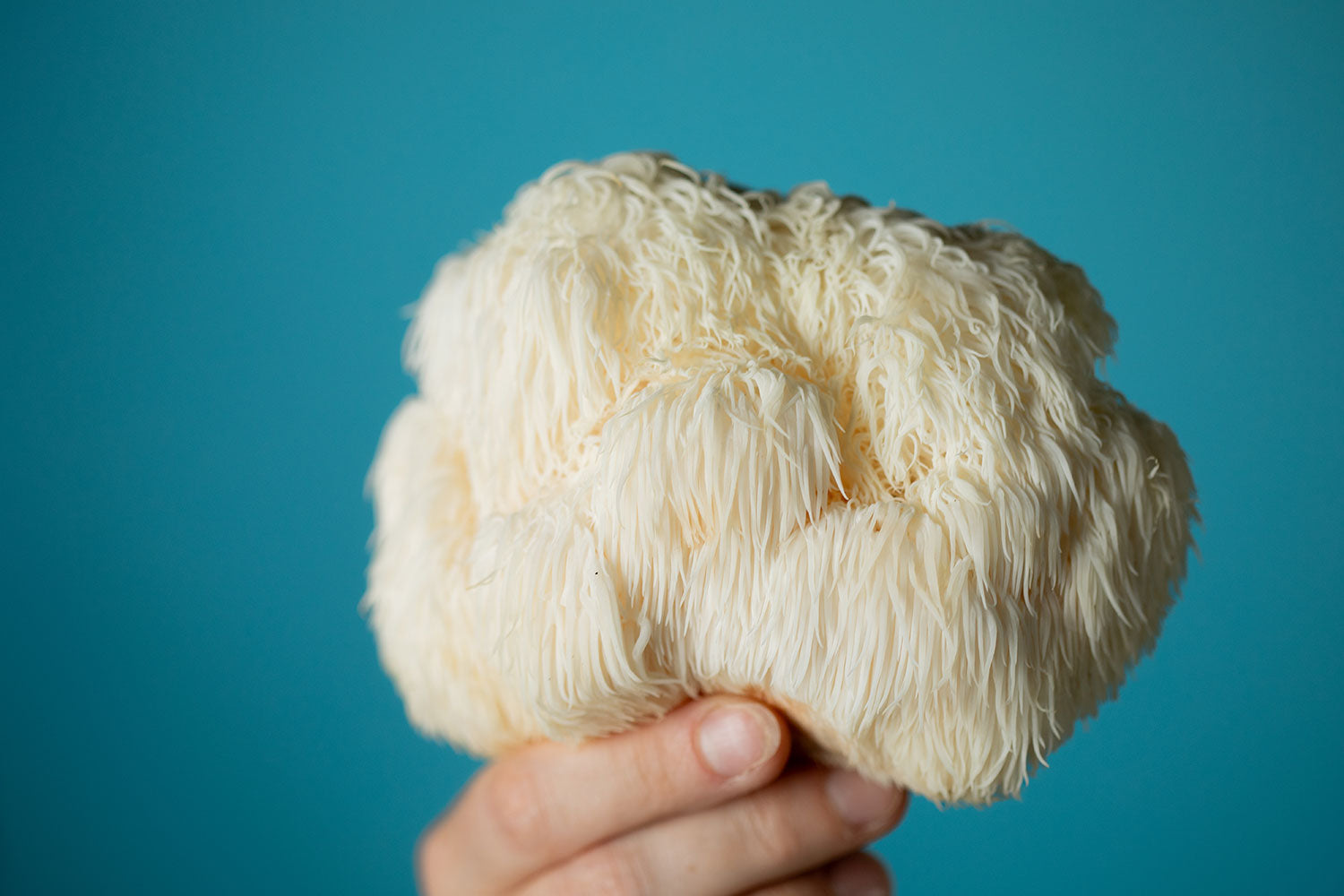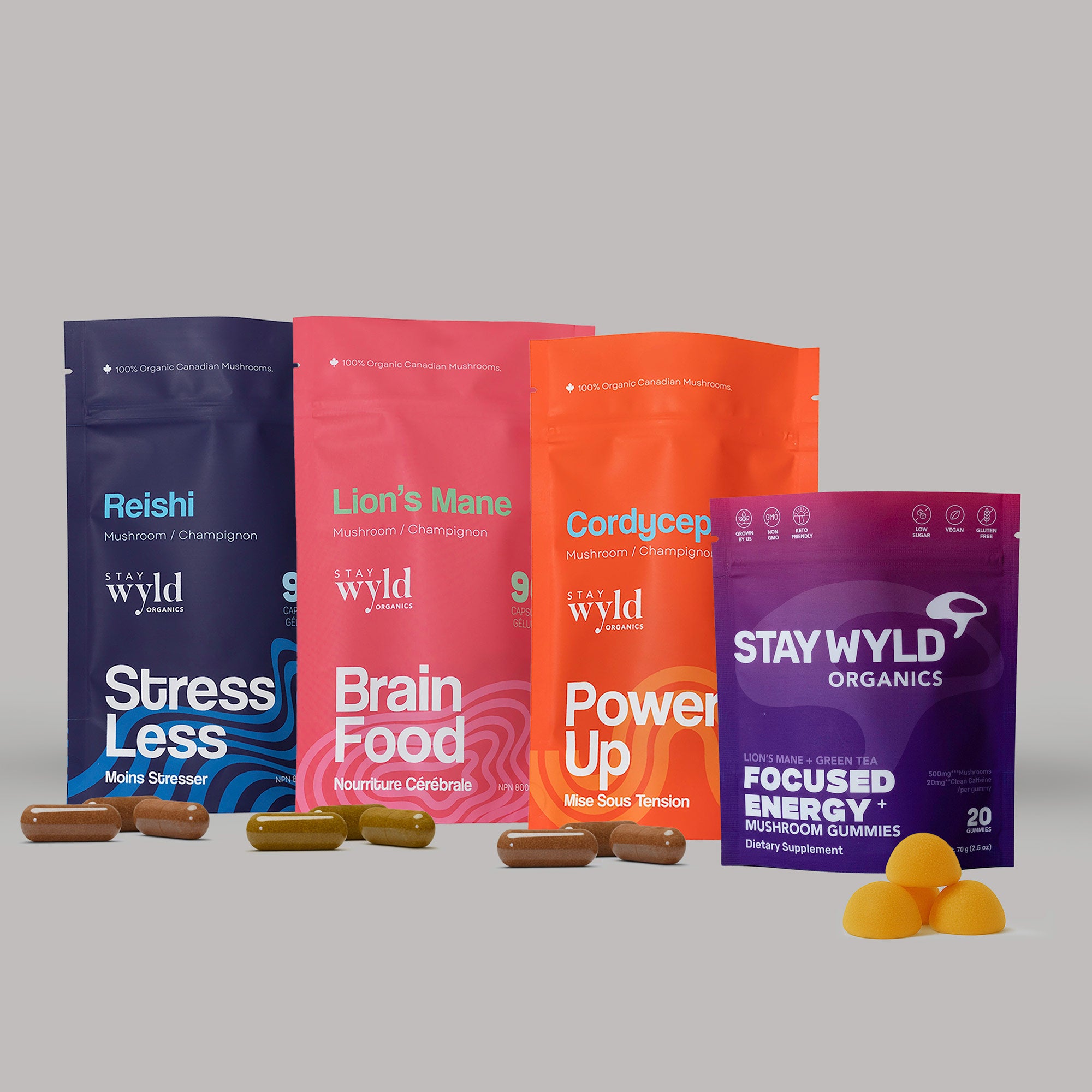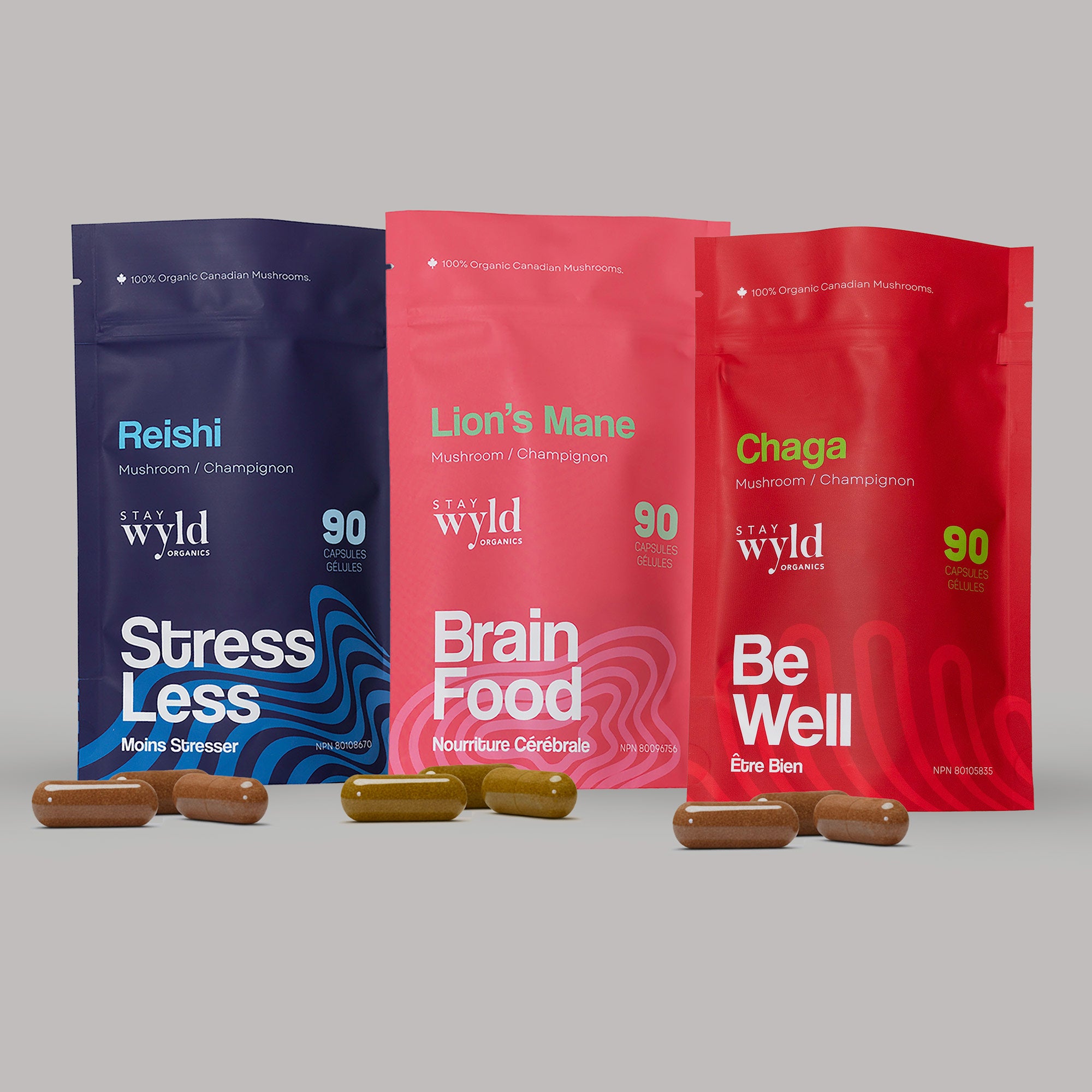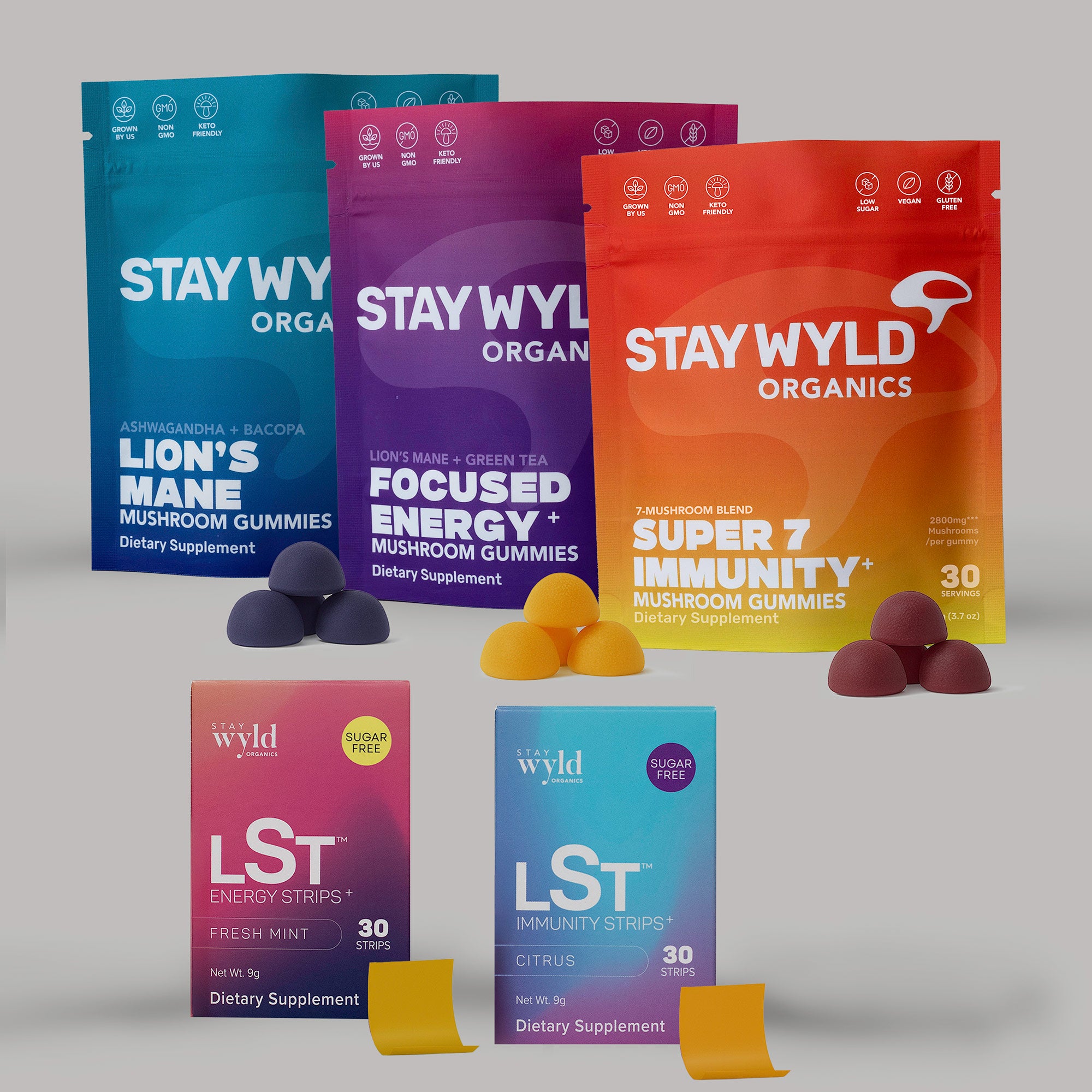Mushroom learning Center
Explore now

Best Sellers



Best Sellers



9 minute read
Not only are mushrooms nutritious to consume, but they’re also beneficial to your mental health, according to Penn State College of Medicine researchers. This research shows that treatment using psilocybin, a psychedelic compound in mushrooms, eases significant depression symptoms for a year or even longer.
The studies show that microdosing psilocybin helps improve cognitive function while alleviating anxiety and depression. An analysis showed adults with a long history of depression taking two psilocybin doses combined with “talk” therapy. The treatment led to a stable and enduring antidepressant outcome in a year of follow-up.
Thus, psilocybin triggers immediate and significant effects that last long, suggesting medicinal mushrooms may be a valuable and unique way of treating depression. Also, compared to other antidepressants you need to take for more extended periods, psilocybin relieves symptoms with the first two doses.
Let’s dive in and explore how medicinal mushrooms help you deal with depression.
Please Note: In the United States, psilocybin is considered a Schedule I substance under the Controlled Substances Act. In Canada, under the CDSA, activities with psilocybin and psilocin, such as sale, possession, and production, are illegal unless authorized by Health Canada. Any ingestion of this substance should be conducted in a controlled and professional setting.
This compound naturally occurs in some mushroom types (psychedelic mushrooms) that you can find worldwide. Psilocybin is hallucinogenic in large doses, meaning it causes auditory and visual hallucinations. Taking the compound may also distort one’s sense of time and perception of everything around them.
Still, it’s difficult to ignore its importance in therapeutic situations, like treating depression.
Psilocybin shows excellent potential in helping those suffering from treatment-resistant depression or anxiety. The best treatment is combining the compound with other therapies instead of having it as a stand-alone treatment option.
Studies show that psilocybin helps ease anxiety and fear in terminally ill patients. Furthermore, researchers in recent times have been exploring how psilocybin may help those dealing with emotional trauma.
Certain discoveries show that pairing it with other therapies is key to this compound’s effectiveness. During therapy sessions, the patient meets their therapist to discuss anticipated goals, and then the therapist administers psilocybin.
After the process, the patient has follow-up visits with the therapist that don’t involve using the drug.
Although there’s a need for more research to confirm the compound’s safety, studies so far show that it’s safe. Psilocybin may cause annoying but mild symptoms in some patients, like over-responsive reflexes, sleepiness, anxiety, nausea, dizziness, and headaches.
That’s why taking the compound under a therapist’s supervision is advisable. The therapist helps the patient prepare ahead of time on how to respond to potential side effects and guides you through them if they occur.
To get maximum benefits from psilocybin, you’ll need to work through and experience some distress or anxiety. Also, ensure that you undergo the entire process in a controlled and safe environment.
People who shouldn’t take psilocybin include those with pre-existing heart conditions (because psilocybin may temporarily increase heart rate and pressure).
Furthermore, its hallucinogenic nature is unsuitable for those with psychosis tendencies, schizophrenia, or family histories of the same.
As for its addictiveness, psychedelics don’t interact similarly to opioids, cocaine, tobacco, or alcohol. Psychedelics belong to a separate drug class, and their risk of abuse or overuse is much less.
Microdosing psilocybin involves taking tiny amounts of it to minimize symptoms of depression and anxiety. The mushroom dosage for depression is so little that it doesn’t cause hallucinations.
There’s inadequate research on the effectiveness of microdosing; thus, you shouldn’t try it before consulting a doctor. While some patients report mental health benefits from microdosing, others claim it causes challenges like migraines, anxiety, and insomnia.
These mushrooms are the types we consume in large quantities without experiencing ill effects. Culinary mushrooms are among the healthiest brain foods in the market because they’re an excellent source of glutathione, ergothioneine, and antioxidants.
A survey of 3,000 over 60 years Americans showed that consuming large quantities of mushrooms improved performance on cognitive tests. Thus, the study indicates that those who consume varying mushroom amounts are significantly less likely to have anxiety and depression.
Scientists may have found a plausible mechanism for protecting humans against depression in ergothioneine, an amino acid that plays the role of an antioxidant. Medicinal mushrooms are the richest source of ergothioneine, vital in protecting the brain against cognitive decline.
Furthermore, minimal oxidative stress may further explain incidences of reduced mental health issues like depression.
On the other hand, glutathione is an excellent antioxidant, and its deficiency may lead to oxidative stress. Reduced glutathione levels show in urine tests of depressed people, meaning that an increase in the antioxidant may aid recovery.
Culinary mushrooms also contain the beta-glucan fiber that helps fight inflammation in the gut-brain axis. While this fiber is present in foods such as oats, researchers believe that beta-glucan fiber in mushrooms increases the human brain’s prefrontal cortex's structural integrity.
Adaptogens aid the body in regaining balance during internal and external stress. Mushrooms such as turkey tail, lion’s mane, cordyceps, and chaga contain adaptogenic properties.
A pathway that responds to adaptogenic mushrooms is the HPA axis (hypothalamic-pituitary-adrenal axis), a critical component in stress response. Adaptogens interact with the axis to regulate mood and stress and improve one’s memory.
The lion’s mane mushroom has significant neuroprotective effects (erinacines and hericenones) that stimulate the protection and growth of neurons in the brain. NGF (erinacines and hericenones) abnormalities lead to lower brain functionality and psychiatric disorders.
While considering the impact of these mushrooms on physical health, the mushrooms may also offer mental health support.
These mushrooms include:
Reishi mushrooms show reduced cancer-related anxiety and fatigue in breast cancer patients. In addition, an animal study discovered that reishi mushrooms have antidepressant potential and reduced anxiety in rats subjected to a stressful experience in the lab.
A study on women experiencing menopause showed that using lion’s mane mushrooms reduced menopausal symptoms, depression, and anxiety. Furthermore, a different study showed that mushroom supplements for depression positively affected mood disorders and helped them sleep better.
The study also showed that lion’s mane increases pro-brain-derived neurotrophic factor (BDNF) that converts to active BDNF. Defects that occur during the conversion of pro-BDNF to active BDNF lead to anxiety-like behaviors, psychiatric disorders, and cognitive impairment.
Lion’s mane mushrooms help improve mental and cognitive health and a healthy balance.
A 2020 study discovered that rats fed high cordyceps concentrations responded to stressful situations with minimal anxiety and depression. Researchers found that mushrooms might prevent stress and depression in humans too.
Research conducted in 2022 by a team from China found that cordyceps could exert antidepressant effects through specific biochemical mechanisms. They discovered biochemical mechanisms such as the CREB-binding protein, which appears as a factor in schizophrenia and depression.
Researchers are still evaluating the effectiveness of psychedelic therapy, so the approach to the therapy in terms of dosage and number of treatments needed may vary depending on the clinician guiding you.
That said, most clinics conduct the therapy in three stages:
Preliminary consultation is the first step to help confirm that there aren’t any contraindications to your treatment. In addition, it creates an excellent opportunity to discuss the goals and concerns surrounding psychedelic therapy.
A trained therapist helps you ingest the psychedelic substance either via injection or orally. Depending on the treatment plan, there may be multiple sessions. For instance:
Integration is the last phase of therapy, where the therapist and patient work through the psychedelic experience.
If you’re interested in taking part in psychedelic therapy in a clinical setup with the help of a professional, start by visiting the accredited therapists' database. The Multidisciplinary Association of Psychedelic Studies manages the database and welcomes questions concerning the therapy.
Also, it’s essential to understand that taking psychedelic substances impairs your consciousness, making you vulnerable to suggestions. For that reason, some people participating in the treatment or studies allege unethical or criminal behavior.
It’s advisable to evaluate a facility's accreditation, read reviews, and determine how to ensure accountability if things go wrong during or after treatment.
Help ease anxiety by relaxing your mind and feeding your brain with flavor-filled, plant-powered, magic mushroom dishes below:
Pair porcini mushrooms with Italian dishes like Cacio e Pepe. Enjoy this creamy mouthfeel, extraordinary flavor, and benefits to your brain health.
Add fuel to the body and brain by replacing beef with mushrooms, a powerful antioxidant in this exquisite Po’ Boy version. Oyster mushrooms make an excellent substitute for the meaty texture.
This recipe helps you feed your brain to thrive. Whether cremini or button mushrooms are your to-go, this soup offers you the perfect experimenting opportunity. You can try chanterelles, oyster, or maitake mushrooms if you live on the wild side.
The savory sweet bacon from the antioxidant-packed shiitake mushrooms takes the place of traditional bacon in this recipe. The pumpkin seeds, garlic, edamame, and kale ensure that the salad bursts with nutrients.
Restore and maintain your mental health and improve cognition with every sip of this comforting and warm adaptogenic drink. Lion’s mane paired with clove, nutmeg, cinnamon, ginger, matcha, and turmeric helps improve your brain health.
The positive impacts of medicinal mushrooms include the following:
Research shows that medicinal mushrooms allow depressed people to rewire their emotions. On the contrary, antidepressants relieve depression by dulling the patient’s emotions.
Psilocybin benefits patients with emotional processing, as opposed to other depression treatments that reinforce disconnection and emotional avoidance.
Research by Professor David Nutt of Imperial College London indicates that psilocybin acts fast and is safe when administered with care. In a study about magic mushrooms, depressed patients showed significant improvement in one week.
Treatment with psilocybin shows lasting relief for five weeks, with only two doses. A different study shows that one dose of psilocybin relieves depression and anxiety in cancer patients.
Certain studies indicate that people suffering from treatment-resistant depression react effectively to psilocybin. The outcomes achieved show that psilocybin resets the patient’s brain.
Treatment-resistant depression means a lack of symptoms relief from tried therapies, including:
Some of the disadvantages of using medicinal mushrooms to treat depression include the following:
Using psychedelic mushrooms to treat depression in the United States is a criminal offense punishable by law. As such, most people don’t wish to find themselves in run-ins with the law as they treat mental health problems.
Also, understanding that you’re dealing with a controlled drug may increase unwanted emotions like paranoia.
Researchers discourage people from using magic mushrooms to self-medicate. There are risks involved that a patient may not be in a position to cope with if left alone. They include:
Due to the illegal nature of magic mushrooms in the U.S., patients having depression can’t receive the treatment options shown by the studies. Therefore, they'd have to take part in new experiments.
Magic mushrooms are functional foods with a variety of health benefits. The more we read about them, the more we understand their ability to improve our lives. Overall, these mushrooms demonstrate their positive impacts on mental health conditions like PTSD, anxiety, and depression.
Consuming mushrooms or taking beverages with mushroom powder is a great way to utilize these fungi to support your mental health naturally.
Learn more about medicinal mushrooms from our learning center.
Stay Wyld Organics does not produce, distribute, or condone the use of psilocybin products. We strictly adhere to all laws and regulations regarding controlled substances. The information on this website is for educational and informational purposes only and does not promote or support the use of illegal substances. By using this website, you agree to abide by this disclaimer and any applicable laws.
All comments are moderated before being published.
This site is protected by hCaptcha and the hCaptcha Privacy Policy and Terms of Service apply.